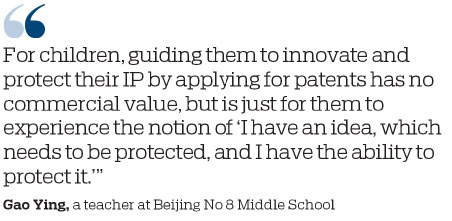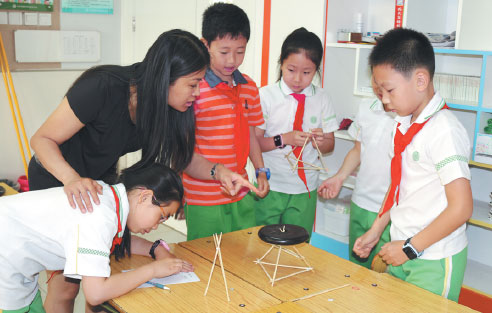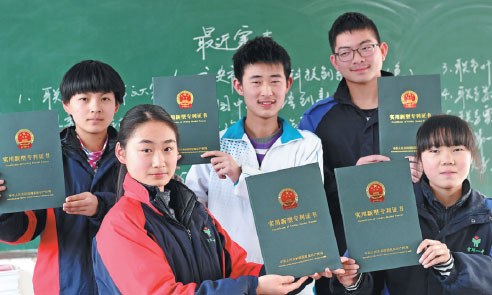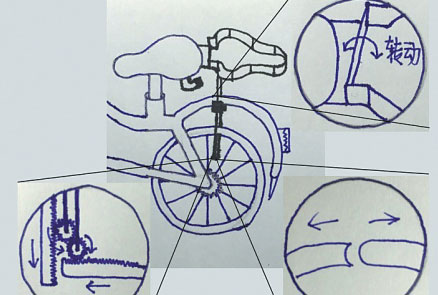Young minds focused on IP education
Schools are promoting the subject to help children prepare to safeguard their inventions now and in later life. Yin Pingping and Yuan Quan report for Xinhua China Features.
Liu Zilu's homework was always smudged because he's left-handed. His left wrist was always smeared with ink, as it rubbed on his exercise books when he wrote. His parents, who are doctors and appreciate cleanliness, tried to prevent the smears, but to no avail.
However, the boy discovered his own solution. He invented a writing glove for left-handed people. Made from elastic gauze or rubber, it has two separate sheaths for the left ring finger and little finger. The glove has concave and convex surfaces, which results in more friction and a smaller contact area with the paper, reducing the likelihood of ink stains on the hand.
With his father's help, Liu, at age 7, applied for a utility model patent for the glove.
"A patent can protect your ideas and your work, so others cannot easily make the same thing," said the second grade student at the Experimental Primary School affiliated to Renmin University of China.
Liu is one of just a few very young people who hold a patent, but he is among a growing number of Chinese students who understand what a patent is and how to protect their intellectual property rights.

In recent years, the government has encouraged IP education. In 2015, the National Intellectual Property Administration of China and the Ministry of Education launched a nationwide pilot demonstration project on IP education in primary and secondary schools.
By the end of last year, 165 primary and secondary schools had been designated as IP pilot schools, 25 as IP demonstration schools and almost 1,000 as IP pilot schools at the provincial level.
China's IP education is among the best in the world. A report by the United States Center for Intellectual Property Understanding listed China as one of the top seven countries for IP education, alongside the US and Japan.
Teaching styles
The High School Affiliated to Renmin University of China is an IP pilot school in Beijing. The teachers use regular textbooks and have held dozens of compulsory courses on patents, trademarks and copyright since 2005.
However, they had difficulty teaching abstract IP concepts, "which are far from the students' lives", said He Lingyan, one of the teachers. "Few students could understand or remember them."
The teachers altered their methods, using the examples of iPhones and shared bikes, with which students were familiar, to explain the IP involved and study patent dispute cases. The method worked.
Meng Shi was inspired. The 12-year-old noticed that people were reluctant to ride shared bikes on rainy days because the saddles were wet. In response, he designed a waterproof cover for the saddle, controlled by the bike lock through a low-cost mechanism. With the help of his teacher, Meng applied for a patent for his invention and tried to contact a bike-sharing company to use it.
Many schools organize activities to teach IP knowledge, such as debating competitions, summer camps, visits to science enterprises and moot courts.
While some people doubt the necessity of IP education at primary or secondary school, as it is mainly a commercial field, Li Zuolin, head of the Renmin-affiliated high school's IP teaching group, said it is "necessary and urgent".
Li recently traveled to the US to attend a science and technology education seminar, where a well-known international publisher was offering free sets of popular science books aimed at young people. When Li asked for a set, the publisher refused, because the books had previously been pirated on the Chinese mainland.
"I was so embarrassed," Li said."It made me understand once again the importance of IP education, which should be stepped up, starting with teenagers."
Hua Bing, founder of a Chinese IP information consultancy, finds that despite China's progress, many people, including business executives and researchers, still don't respect IP rights.
"They do not care about infringement or even being infringed, because people of my generation and previous generations grew up with very limited exposure to IP concepts," Hua said, noting that China's patent law was published in 1985 and people just a decade or two older are unfamiliar with the concept of IP.
"I really think it's necessary to cultivate awareness of IP protection from a young age. When children receive IP education and participate in related activities at school, they may influence their parents at home, which will gradually improve society as a whole."
Not just profit
For many years, China has ranked No 1 in the world in terms of applications for patents, trademarks and industrial designs.
However, some parents have mistakenly used IP as a means for their children to earn extra points in the fierce competition to enter top schools.
According to a member of staff at the National Intellectual Property Administration, a father working in a scientific research institution made an invention for his child and applied for a patent ahead of the school entry examinations. Once the child had enrolled at a leading high school, the family abandoned the application, because it was "useless".
In March, the Ministry of Education stipulated that patents will no longer be used as score items for university enrollment.
The policy will not dampen the students' enthusiasm, said Gao Ying, a teacher at Beijing No 8 Middle School. "It will ask children to focus more on innovation, rather than 'added value'."
An inventive mind
Wei Hanxiao loves inventing things. With school classmates, he designed a waste-recycling device for a 3D printer and applied for a patent.
"It is good training," said the 17-year-old, who has received an offer from a prestigious university in Canada to major in electronics and computer engineering. The patent application experience helped him understand the importance of IP protection.
"My future career will definitely involve frequent patent applications," he said."Experience in high school is very helpful."
According to the government, IP education in primary and secondary schools can help pique young people's curiosity, train their intelligence and enhance their practical abilities.
Gao always tells her students, "Respect for IP rights first requires respect for knowledge, then for rights." However, she is concerned that emphasizing rights first will lead the children to focus too much on profit and neglect the sharing of knowledge.
"The purpose of IP protection is to stimulate desire and energy to create value for society, rather than immediate personal interests," she said.
"For children, guiding them to innovate and protect their IP by applying for patents has no commercial value, but is just for them to experience the notion of 'I have an idea, which needs to be protected, and I have the ability to protect it'."
|
|
|
Students from a middle school in Anhui province display patent certificates they received from the National Intellectual Property Administration of China in 2017.Chen Li/for China Daily |
|
A sketch for a waterproof seat cover for shared bikes designed by a student in the seventh grade in Beijing.Provided To China Daily |
(China Daily Global 11/01/2019 page5)





















